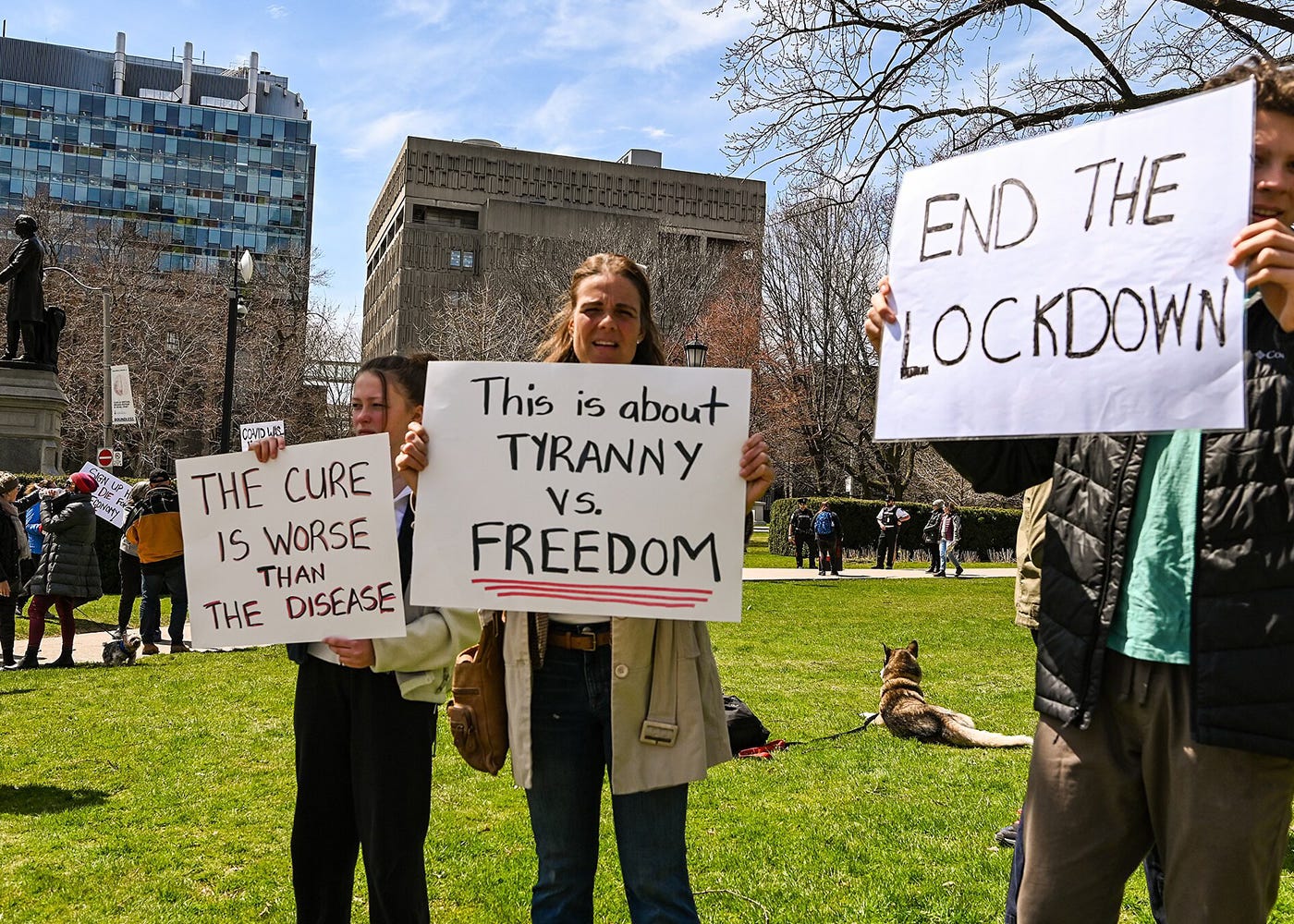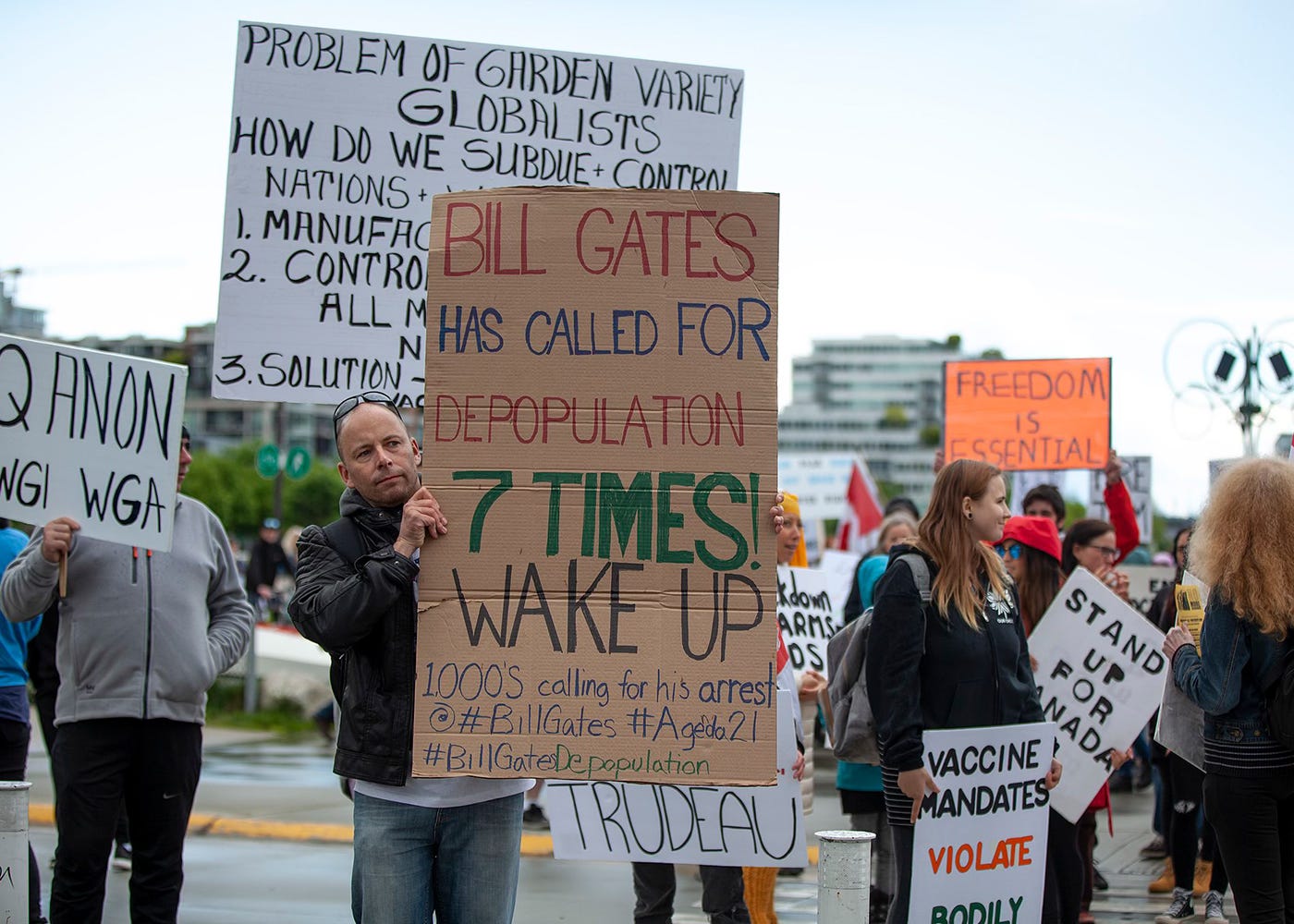
I think that flower-children are responsible for Trumpism, for the extreme Right, for social dislocation, for political violence. I realise that this is a provocative statement.
Over the coming weeks I intend to publish a sequel to my Lessons from the Counterculture series, that will explore the role of the hippie movement and the countercultural Left in the development of computers, Silicon Valley and the rise of the authoritarian Right. This article is a primer.
The Age of Conspiracies
During the lightless depths of the Covid pandemic, the weeks of despair, in which people screamed from high-rise windows, sobbed amongst the ruins of their businesses, moved into the spare room because they couldn’t move out, were trapped in silence yet surrounded, everywhere, by unbearable noise, I noticed a recurring phenomenon: people that I knew (all men, all middle-aged, and with broadly liberal attitudes), were departing from the excruciating prison of reason and joyfully entering the mad kingdom of conspiracy theory.
These men talked to me urgently about the villainous machinations of the World Economic Forum and its plans for global genocide, of the complicity of the “mainstream media”, of murderous tyrants and evil scientists: George Soros, Anthony Fauci, Klaus Schwab, Bill Gates. They advised me to flee from the chemical-weapon attacks known euphemistically as “vaccine programmes” and steer clear of 5G mobile phone towers.
Initially, I took their mania for a natural defensive response. People who are unable to deal with the chaos of an indifferent universe have to believe that there is some authority in charge, that order must be located somewhere. They struggle to comprehend that we are all just marginally evolved primates clinging to a ball of rock in the infinite void of space and that, yes, a banal and motiveless microorganism can spontaneously appear and start bumping off the world’s population. No, in their minds existence cannot simply be this meaningless. Even for secularists, there must be a plan, and so they attributed Covid to phenomena that seemed vaguely proximate to the main characteristics of the pandemic: vaccines, medical institutions, medical professionals, economists, politicians and the media that amplified their messages.
But as time wore on, I noticed their beliefs transmogrify in unexpected ways. Conspiracy theories are inherently impervious to the demands of evidence, so when conspiracists make predictions and these predictions fail to materialise, they typically explain it away by some evolution in the theory – for example religious cults, “the messiah did not arrive as predicted because we are not worthy/he delayed until some future event” etc. With the Covid conspiracies, however, the details appeared to just be abandoned altogether, for example I stopped hearing “5G will kill everyone” or “there will be mass deaths, numbering in the billions, from vaccinations”, but the core theme that there is an elite that wants to control and manipulate the population, remained (together with its central protagonists - Schwab, Fauci etc) and served as a reference point for every new shock, crisis or grievance that might present itself: migration, Jeffrey Epstein, the Ukraine war, climate change, advertising on Twitter, inflation, changes to the tax code.
In other words conspiracy, and conspiratorial thinking, had become less of a system of specific beliefs and more of an animating spirit within the broad landscape of our culture and our politics. How did this express itself in political terms? There were numerous effects, but an obvious one was that many of these people were pushed towards populist politics, mainly Right-wing populism, but also the populist Left.
Contemporary Populism
In Lessons from the Counterculture, I talked about the collapse of traditional Left/Right politics and the emergence of weird and paradoxical populist tendencies on both the Right and the Left. In the intervening months, we have seen spectacular examples of these tendencies as the crisis in our politics deepens: the return of Trump in the US, the rise of populists in Europe and, in the UK, a landslide election victory for the Labour Party that has been followed, within the space of weeks, by pervasive dissatisfaction with Labour, renewed hostility to the Conservatives and a surge in support for smaller populists, most vividly the Reform party.
As I wrote in Lessons, I think that we are in an unabating political crisis that began with the collapse of Neoliberal Capitalism in the 2008 crash. There was a need, in the aftermath of the crash, to re-imagine the global economic system and its supranational institutions, but instead the whole edifice was re-erected and what has emerged since is a kind of Zombie Capitalism, staggering on lifelessly, slowly degrading our economies, our culture, our politics and our planet.
I think people generally sense this crisis, even if they can’t articulate it in conscious terms, and this in part explains the wild political aberrations that we have seen over the past decade. The volatility that swung Donald Trump between the White House and the courthouse and back again, that pitched the UK out of the EU, that hands landslide majorities to governments which show record levels of unpopularity within months of their election, is a manifestation of electorates trying to find refuge from the Zombie. No-one from the political classes has yet presented a credible alternative, so electorates cast around either trying to find one, or to protest, pulling whatever levers are at their disposal and sending chaos into the body politic.
The form of contemporary populism that this has produced is paradoxical because it synthesises authoritarianism and libertarianism, communitarianism and individualism. Again, I went into this theory in depth in Lessons, so I won’t repeat it all here, except to say that I argued that our contemporary politics has been distorted by a form of libertarianism that emerged from the Counterculture of the 1960s. It was an ideology that was (and is), solipsistic, narcissistic, inherently Right-wing and, also, paranoid, which is where the conspiracies come in.
Rise of the Techno-Fascists
Returning to the people I knew who embraced conspiracy theories during the Covid pandemic, and who have since been seduced by populism, there was something about them which initially eluded me but which I came to notice: their susceptibility to conspiracy predated the pandemic. Covid set it off on steroids, but it was there already, it wasn’t simply a reflexive response to the chaos of an indifferent universe. Although I’m sure that reflex was part of it, there was something else, something that was already part of their lives and which, during the pandemic, became all-consuming: the habit of spending far too much time on the internet.
During my lockdown-era conversations with these people, I was struck by how regularly Bill Gates surfaced as a target of their opprobrium. There were marches all over the world in which conspiracy theorists wore Bill Gates face masks and waved deranged signs that read “you can shove your vaccines up your ass”, “when tyranny becomes law resistance becomes duty”, “children are not prostitutes” and “Bill Gates is evil!”.
I became fascinated by this. I wasn’t familiar with the details of Gates’s bio, other than that he founded Microsoft, was once the world’s richest man, and had a philanthropic organisation. It was amazing to me that this dull, bookish businessman could inspire passion on any level, let alone on the level of genocidal conspiracy and child prostitution. I thought I’d look into it. I pitched a Bill Gates film, my business partner liked it, as did our distributor and some other film distributors and sales agents, so I set to work.
I appreciate that there are those who find technology incredibly compelling. I am not one of them. In the main, I find technology dull. My feelings about computers are similar to my feelings about cars – I value their assistance. Some people love cars, they eulogise about achievements in engineering, fetishise the iconic brands, dedicate hours to watching Formula 1; I don’t understand any of these behaviours. For me, cars are a means of getting from a-to-b, usually to pick up shopping or drop the kids off, that’s it, that’s the limit of my interest, and the same is true of computers: if they can help me to write this newsletter or send an email, great, I’m not otherwise interested.
So I approached the Gates story, and the wider context of the development of computer technology, from a starting point of complete ignorance. As I began to assemble the details, I started to notice themes that I think computer historians, those with a genuine interest in the technology, have missed, in particular that computers developed not as a neutral expansion of technological capability, but as a product of political ideology.
We have recently come to understand something about the political economy of Silicon Valley and the direct influence that characters like Elon Musk and Peter Thiel have on our politics. What I’m not certain of, however, is how well we have understood the more insidious, general influence that computer technology itself, rather than just the activities of random tycoons, has had on our political consciousness.
In the final parts of Lessons from the Counterculture I explored how the hippie movement and countercultural Left eventually ended up joining the political Right, in a manner that was entirely congruent with their underlying ideology. What I hadn’t realised until I started researching the Gates film, was the extent to which those same hippies and counterculturalists had been responsible for the development of personal computers. Adam Curtis’s peerless documentary series All Watched Over by Machines of Loving Grace tells some of this story, but not all of it.
For hippies in the 1960s, the coming cyber age represented a utopia of individual freedom enabled by computers, and liberation from the coercive power of the state, but it was their ideology, selfishness and failure that has led to the resurgence of the authoritarian Right. In my view the conspiracy theories, culture wars, populism and political violence that blights our current moment can in no small part be attributed to role the that technology plays in our lives and the ideologies at work behind it.
I will start the story soon, watch this space.








